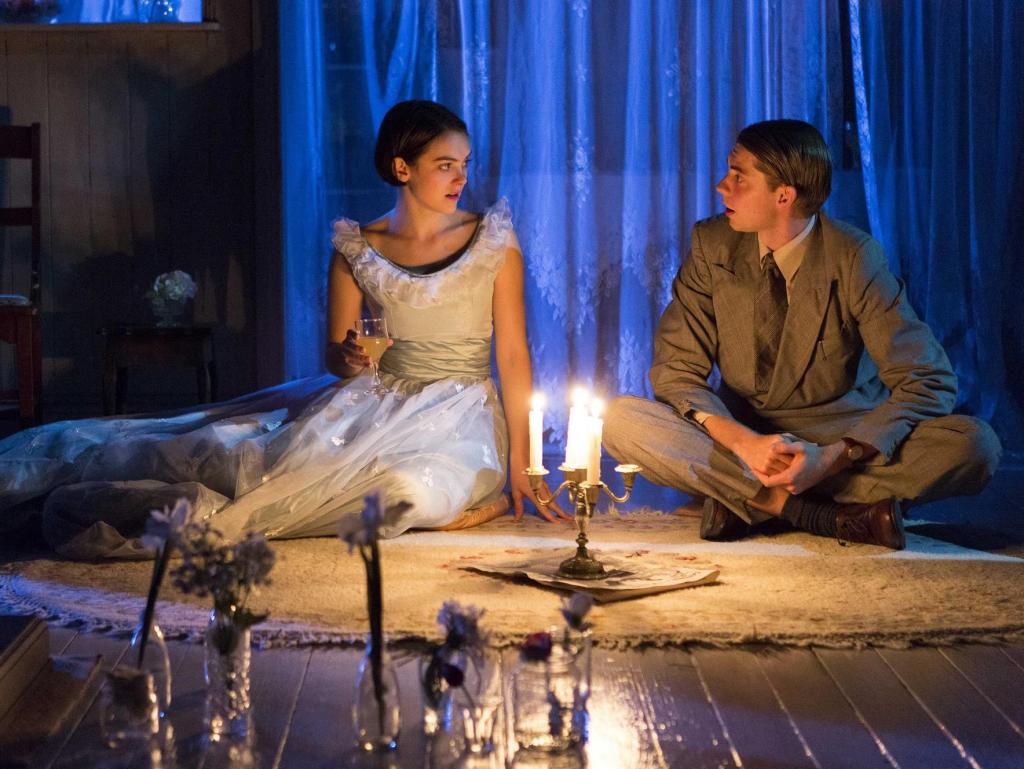Image by Brett Boardman.
This heart-wrenching American classic from Tennessee Williams in 1944 was his first major hit. It was also deeply autobiographical, focusing on his literary escape from an oppressive childhood, leaving behind a manipulative, single mother and a troubled sister who later suffered a botched lobotomy. (She was then forever institutionalised but survived Tennessee by 13 years).
And so Tennessee is just a breath away as young Tom Wingfield introduces this ‘memory play’ returning us to his fraught family life in their modest 1930’s apartment.
Outside, beyond the fire escape, Tom occasionally steps out to reposition a circle of cameras projecting key moments onto screens on either side of Michael Rankin’s set. Camera theatre is a bit of a Belvoir signature, but here it works well, especially with the projected chapter titles coined originally by Williams. We indeed see this world through memory, frozen into alternative, black and white, almost romantic moments of 1930’s cinema.
But on stage, life is more unforgiving, and brutal.
Pamela Rabe is outstanding as the fiercely frustrated, former southern belle Amanda, long abandoned by her husband. She is desperate Tom doesn’t follow him in moral decay and that her shy, mildly crippled daughter Laura will snatch herself a gentleman caller and find security.
For both mother and son, hysteria is always close by in this steamy southern world, as hopes for love, sex and fulfillment fade, and outside, a hard American opportunism stomps over those too retiring and too different.
Newcomer Rose Riley adds a nice stubbornness to the usual frailty of Laura, and Harry Greenwood brings a gawky tenderness to the one gentleman caller who finally arrives. He shares with Laura his optimistic tips on thriving in modern America – and then leaves.
Luke Mullins, so memorable in Belvoir’s award-wining production of Angels in America, is more languorous then effete as the excitable Tom. With director Eamon Flack, he makes clear that Tom is gay (or a ‘Miss Nancy’ as Tennessee’s remote father used to call him). This modern queering of Tom satisfactorily names the truth which is disguised in the play’s dark, poetically obscure allusions to where Tom escapes every night, adding yet another, clearer example to this family’s striving for life.
Flack’s impressive production lags slightly in energy in the final act, and the end lacks the crashing reality it should, but he rightly focuses on the quiet agonies and oppressions of these out-of-step young Americans. Costumes by Mel Page are vivid and Stefan Gregory’s soundscapes match perfect the play’s sentiment.
Rating: 4 out of 5 starsThe Glass Menagerie
By Tennessee Williams
Director: Eamon Flack
Set Designer: Michael Hankin
Costume Designer: Mel Page
Lighting Designer: Damien Cooper
Composer & Sound Designer: Stefan Gregory
Video Design Consultant: Sean Bacon
American Dialect Coach: Paige Walker-Carlton
Assistant Director: Jada Alberts
Stage Managers: Isabella Kerdijk, Luke McGettigan
Assistant Stage Manager: Katie Hankin
Production Secondment: Fraser Orford
Cast: Harry Greenwood, Luke Mullins, Pamela Rabe. Rose Riley
Beloir, Upstairs Theatre, Surrey Hills
www.belvoir.com.au
20 September – 2 November





